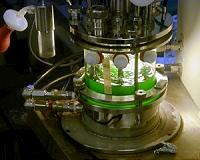 |
St. Louis (UPI) Apr 21, 2010 A biofuel-powered flight of Boeing's F/A-18F Super Hornet will mark Earth Day Thursday, being observed worldwide with millions of "green" acts aimed to raise awareness of climate change. The unmodified aircraft will take off from Naval Air Station Patuxent River, Md., and will be powered by a sustainable biofuel blend of 50 percent camelina and 50 percent JP-5 aviation fuel, said the Boeing Co., whose teams are helping the flight. Biofuel-powered flight tests over the past few years have involved several kinds of agricultural feedstock as well as algae. Amid continuing research, the emphasis has shifted from easily available vegetation and food crops to renewable sources that are considered less likely to impact on world food supply. The U.S. Navy is actively pursuing a program to operate with renewable energy sources, including sustainable biofuels. Thursday's flight is part of the Navy's strategy to halve reliance on fossil fuels over the next decade, the company said. Added to the green initiative is the Obama administration's broader emphasis on increased energy-efficiency in the armed forces. That includes the pursuit of green energy use in the the Navy and Marine Corps that got special mention from Navy Secretary Ray Mabus. Boeing has been assisting the Navy through laboratory testing of fuel properties and engineering evaluations of fuel system compatibility, said Tim Vinopal, environmental chief engineer at Boeing Defense, Space & Security, a unit of the Boeing Co. "We have worked closely with the aviation and fuels industries for several years to provide our customers with options to reduce environmental impact, including the use of sustainable biofuels," Vinopal said. Boeing biofuel testing has included demonstration flights of five commercial aircraft, testing of four engine types and laboratory testing with various fuel processors, feedstocks and engine manufacturers to ensure the fuels meet or exceed the high-performance and quality standards specified for current aviation fuels, without modification to the engine or airframe. Camelina is one of several promising biofuel crops, as it requires little water or fertilizer and doesn't compete with food crops. The rise in global research in biofuels development for aviation and ground-based transportation has led to the emergence of a commercial market in renewable fuels. Brazil, New Zealand and other countries are actively seeking to create niche areas for commercial exploitation. The Algal Biomass Organization, which supports renewable marine sources for new forms of green energy, is one of the global bodies backing efforts by developers such as Boeing. However, experts differ on how biofuels could contribute to reduction in carbon emissions. While industry researchers estimate that biofuels could reduce flight-related, greenhouse-gas emissions by 60 to 80 percent, environmental campaigners say future increases in aviation could cancel out those reductions. Kenneth Richter, Friends of the Earth aviation campaigner, said, "Biofuels are a major distraction in the fight against climate change." British scientist Bob Watson warns biofuels could exacerbate climate change rather than combat it.
Share This Article With Planet Earth
Related Links Bio Fuel Technology and Application News
 Work Aims To Re-Engineer Algae For Biodiesel Production
Work Aims To Re-Engineer Algae For Biodiesel ProductionWest Lafayette IN (SPX) Apr 20, 2010 A Purdue University researcher will lead a portion of a federally funded effort based at Iowa State University aimed at creating genetically engineered algae for environmentally friendly biodiesel production. Currently, hydrocarbon fuels such as diesel and gasoline require complex chemical processing to be manufactured and are made primarily from non-renewable fossil fuels, which are being ... read more |
|
| The content herein, unless otherwise known to be public domain, are Copyright 1995-2010 - SpaceDaily. AFP and UPI Wire Stories are copyright Agence France-Presse and United Press International. ESA Portal Reports are copyright European Space Agency. All NASA sourced material is public domain. Additional copyrights may apply in whole or part to other bona fide parties. Advertising does not imply endorsement,agreement or approval of any opinions, statements or information provided by SpaceDaily on any Web page published or hosted by SpaceDaily. Privacy Statement |